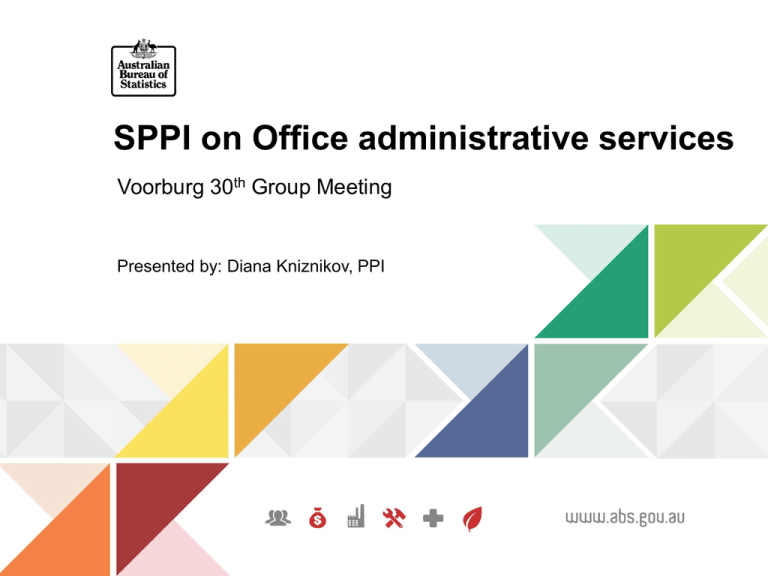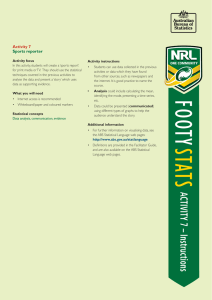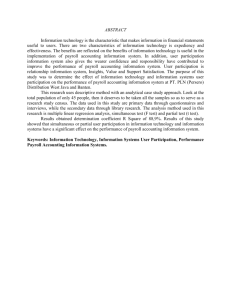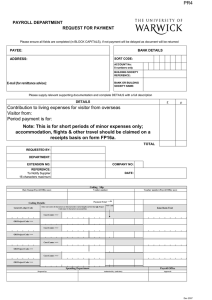SPPI on Office administrative services Voorburg 30 Group Meeting
advertisement

SPPI on Office administrative services Voorburg 30th Group Meeting Presented by: Diana Kniznikov, PPI Introduction • Industry overview • Classification • Services to be priced • Evaluation of turnover data • Pricing methodologies • Challenges Industry overview (cont’d) • Office administrative services is a growing industry with a moderate level of competition. • It consists of companies that provide a range of everyday office administrative services such as clerical, billing and record keeping. • The high fragmentation of this industry means that there are few major players, and the industry is populated by smaller businesses which service narrow regional or product markets. • The increase in compliance with government regulations and legislation is a growing factor in the drive towards outsourcing payroll activities. • The total output ($9.1bn), based on ABS's latest 2009-10 InputOutput data Industry overview (cont’d) Summary of Australian businesses classified as office administrative services No. of Employment Band enterprises Percentage of enterprises Non Employing 4,147 39% 1-19 Employees 5,840 55% 20-199 Employees 612 5.7% 200+ Employees 34 0.3% Total 10,633 100% Classification Classification structure: ISIC Revision 4 versus ANZSIC 2006 ISIC Rev 4 Div N Administrative and support activities ANZSIC 2006 Div N Administrative and support services Subdiv 82 - Office administrative, office support and other business support activities Group 821 - Office administrative and support activities Class 8211 - Combined office administrative service activities Class 8219 Photocopying, document preparation and other specialized office support activities Subdiv 72 - Administrative services Group 729 - Other administrative services Class 7291 Office administrative services Class 7292p* – Document preparation services Class 5101p* - Postal services *partial correspondence (denoted by ‘p*’) is an indication that only part of that particular ANZSIC class corresponds to the other ANZSIC class Services to be priced Product and services segmentation of office administrative services 4% 4% 2% Payroll processing 5% Billing and record keeping Reception services 15% Clerical services Business administation 70% Source: IBISWorld 2015 Other administrative services Types of Services Pricing methodologies • After meeting with key businesses within the industry it was determined that Payroll services can be priced using model pricing. • Specifications are established with the business when they are enrolled into the survey. • In the approach adopted by the ABS, contract prices are based on models of packaged services (which are influenced by employee number/size of business) for hosting and non-hosting. Pricing methodologies (cont’d) • The index structure used for compiling the experimental index for class 7291 is shown below. ~21% ~49% ~30% Pricing methodologies (cont’d) • An example of a specification for payroll services of Hosting may include: – E-payroll Hosting Basic package for 30 employees priced on a monthly basis (excluding GST). • An example of a specification for payroll services of NonHosting may include: – Managed services package for 10 employees with payroll services, leave management and superannuation options included. Priced on a monthly basis (excluding GST). Weighting methods • The main data source for ABS PPI weights at the class level is National Accounts supply use tables at the IOPC level. • Below the class level the ABS derives PPI weights using a variety of data sources for revenues. Challenges • Market concentration • Government regulations and legislation • Technological changes • Quality adjustments Conclusion • The office administrative services industry is a growing industry with a moderate level of competition. • Payroll services (70%) account for the largest share of industry revenue within class 7291. This can be further split into Hosting(21%) and Non-hosting(49%) services. • ABS adopted a model pricing method and is planning to use it in compiling it’s experimental index. • There are also many challenges in measuring this industry such as impact of market concentration, and technological changes. Questions ???? Contact details: Email: diana.kniznikov@abs.gov.au


